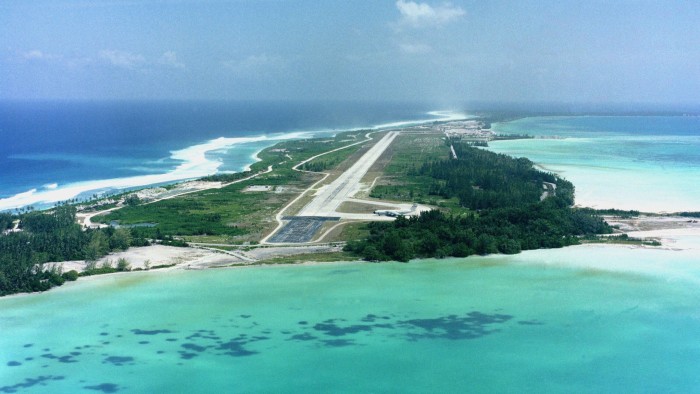Unlock the Editor’s Digest for free
Roula Khalaf, Editor of the FT, selects her favourite stories in this weekly newsletter.
Since agreeing it last October, Britain’s Labour government has been firefighting opposition to its deal to hand sovereignty of the Chagos Islands, a strategic archipelago in the Indian Ocean, to Mauritius. The UK was under pressure to do so from an advisory opinion by the UN’s highest court and a UN general assembly vote. Critics have warned, however, that the deal could threaten the UK-US military base on Diego Garcia — though this is supposed to be protected by a 99-year lease — and enable China to expand its power in the Indian Ocean. A delay to this week’s planned finalisation should ensure the deal gains approval from the new administration of Britain’s key ally — and that some of its flaws are addressed.
The Chagos were the scene of one of the most shameful episodes in Britain’s late colonial history. The UK in 1965 took direct control of the islands and paid £3mn compensation to Mauritius, which as a UK colony had previously administered them, so that construction of the Diego Garcia base could go ahead. The islands’ entire 1,500-plus population were forcibly displaced without proper compensation, many to squalid settlements in Mauritius and the Seychelles, and have never been allowed to return.
When Mauritius gained independence in 1968 its new constitution laid claim to the Chagos. It has long argued that the UK’s 1965 purchase violated a UN principle that colonial territories should not be divided pre-independence. In 2019, the International Court of Justice backed the Mauritian claim in an advisory ruling; a UN tribunal in 2021 concurred.
This was a quandary for the UK. Complying with the ruling might endanger a vital UK-US strategic asset over which, Britain argued, it had legitimately secured long-term sovereignty. Failure to do so would risk Britain’s reputation as a defender of a rules-based international order coming under increasing strain. The Conservative government’s decision to begin negotiations in 2022 is understandable.
The resulting agreement, however, was imperfect. Mauritius is almost 1,400 miles from the Chagos and has no real links beyond the fact that both territories were transferred from France to Britain in 1814. Though Chagossians will gain the right of return, they were not involved in the negotiations and some wanted self-rule.
Britain will reportedly pay billions of pounds to Mauritius for the 99-year lease of Diego Garcia and in financial support and infrastructure investment. But US and UK critics have been concerned that Mauritius might in future be persuaded to annul the lease in favour of China, which has been wooing it — or allow Beijing to establish a presence on another of the islands.
Britain’s Labour government may have been over-optimistic in rushing to wrap up a deal weeks before a potential change of administration in the US — and with a Mauritian government that already appeared to be on the way out in November elections. The new Mauritian leader, Navin Ramgoolam, demanded further concessions.
Senior UK officials note that the Biden White House endorsed the deal. They say they have heard no direct objections from the incoming US administration — though Marco Rubio, Donald Trump’s pick for secretary of state, said in October the agreement posed a “serious threat” to US national security.
A pause is now inevitable. It allows time for the UK and US to ensure that lease arrangements around the Diego Garcia base are as legally watertight as possible, and that Chagossians are properly consulted. But for now Britain’s prime minister Sir Keir Starmer is left in a bind — stuck between his good intentions and geopolitical realities.



